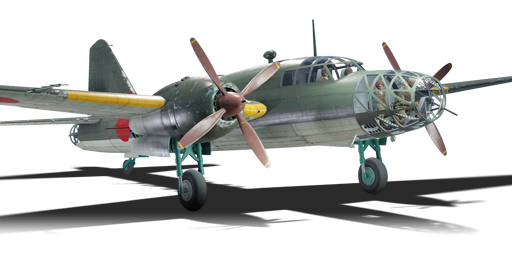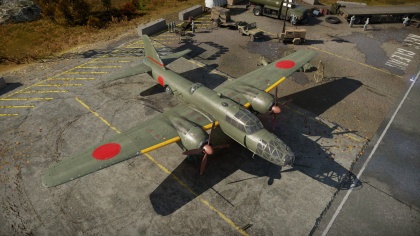Difference between revisions of "Ki-67-I otsu"
(→Flight performance) |
(→Pros and cons) |
||
| Line 193: | Line 193: | ||
=== Pros and cons === | === Pros and cons === | ||
| − | ''Summarise and briefly evaluate the vehicle in terms of its characteristics and combat effectiveness. Mark its pros and cons in the bulleted list. Try not to use more than 6 points for each of the characteristics. Avoid using categorical definitions such as "bad", "good" and the like - use substitutions with softer forms such as "inadequate" and "effective".'' | + | <!--''Summarise and briefly evaluate the vehicle in terms of its characteristics and combat effectiveness. Mark its pros and cons in the bulleted list. Try not to use more than 6 points for each of the characteristics. Avoid using categorical definitions such as "bad", "good" and the like - use substitutions with softer forms such as "inadequate" and "effective".''--> |
'''Pros:''' | '''Pros:''' | ||
| − | * | + | *Regular Japanese torpedo as option |
| + | **Torpedo has the highest drop speed in the game at 350 mph (580 km/h) and is one of the most feared torpedoes in Naval Battles | ||
| + | * Good armor protection for pilot | ||
| + | * Decent Rate of turn time for bombers ({{Annotation|29 s|Arcade Battles}} | {{Annotation|30 s|Realistic Battles}}) | ||
| + | * Decent Rate of climb for bombers ({{Annotation|16 m/s|Arcade Battles}} | {{Annotation|12.5 m/s|Realistic Battles}}) | ||
'''Cons:''' | '''Cons:''' | ||
| − | * | + | * Regular Japanese army bomber ordnance |
| + | ** Max weight of 800 kg (8 x 100 kg) | ||
| + | ** Heaviest bomb choice is a singular 500 kg | ||
| + | * Big target for naval battles | ||
| + | ** Japanese Aerial torpedoes have the shortest range of all aerial torpedoes | ||
| + | * Poor armor protection for back gunners | ||
== History == | == History == | ||
Revision as of 23:17, 18 September 2020
Contents
| This page is about the Japanese bomber Ki-67-I otsu. For the other version, see Ki-67-I Ko. |
Description
The Ki-67-I otsu is a rank III Japanese bomber
with a battle rating of 4.7 (AB/RB) and 5.0 (SB). It was introduced in Update 1.67 "Assault".
General info
Flight performance
| Characteristics | Max Speed (km/h at 5,150 m) |
Max altitude (meters) |
Turn time (seconds) |
Rate of climb (meters/second) |
Take-off run (meters) | |||
|---|---|---|---|---|---|---|---|---|
| AB | RB | AB | RB | AB | RB | |||
| Stock | 483 | 466 | 9300 | 31.0 | 31.8 | 10.0 | 10.0 | 650 |
| Upgraded | 528 | 502 | 29.0 | 30.0 | 16.0 | 12.5 | ||
Details
| Features | ||||
|---|---|---|---|---|
| Combat flaps | Take-off flaps | Landing flaps | Air brakes | Arrestor gear |
| ✓ | ✓ | ✓ | X | X |
| Limits | ||||
|---|---|---|---|---|
| Wing-break speed (km/h) |
Gear limit (km/h) |
Combat flaps (km/h) |
Max Static G | |
| + | - | |||
| 650 | 300 | 450 | ~4 | ~1 |
| Optimal velocities | |||
|---|---|---|---|
| Ailerons (km/h) |
Rudder (km/h) |
Elevators (km/h) |
Radiator (km/h) |
| < 360 | < 360 | < 360 | > 313 |
| Compressor (RB/SB) | ||
|---|---|---|
| Setting 1 | ||
| Optimal altitude | 100% Engine power | WEP Engine power |
| 2,200 m | 1,810 hp | 1,973 hp |
| Setting 2 | ||
| Optimal altitude | 100% Engine power | WEP Engine power |
| 5,800 m | 1,610 hp | 1,755 hp |
Survivability and armour
Examine the survivability of the aircraft. Note how vulnerable the structure is and how secure the pilot is, whether the fuel tanks are armoured, etc. Describe the armour, if there is any, and also mention the vulnerability of other critical aircraft systems.
Armaments
Suspended armament
The Ki-67-I otsu can be outfitted with the following ordnance:
- 15 x 50 kg Army Type 94 GPHE bombs (750 kg total)
- 8 x 100 kg Army Type 94 GPHE bombs (800 kg total)
- 3 x 250 kg Army Type 92 GPHE bombs (750 kg total)
- 1 x Type 91 Mod.3 torpedo
- 1 x 500 kg Army Type 92 GPHE bomb (500 kg total)
Defensive armament
The Ki-67-I otsu is defended by:
- 1 x 20 mm Ho-5 army cannon, dorsal turret (500 rpg)
- 1 x 12.7 mm Ho-104 army machine gun, nose turret (550 rpg)
- 1 x 12.7 mm Ho-104 army machine gun, 2 x beam turrets (500 rpg)
- 2 x 12.7 mm Ho-104 army machine guns, turret (700 rpg + 500 rpg = 1,200 total)
Usage in battles
Describe the tactics of playing in an aircraft, the features of using aircraft in a team and advice on tactics. Refrain from creating a "guide" - do not impose a single point of view, but instead, give the reader food for thought. Examine the most dangerous enemies and give recommendations on fighting them. If necessary, note the specifics of the game in different modes (AB, RB, SB).
Manual Engine Control
| MEC elements | ||||||
|---|---|---|---|---|---|---|
| Mixer | Pitch | Radiator | Supercharger | Turbocharger | ||
| Oil | Water | Type | ||||
| Controllable | Controllable Not auto controlled |
Not controllable Not auto controlled |
Controllable Not auto controlled |
Combined | Controllable 2 gears |
Not controllable |
Modules
| Tier | Flight performance | Survivability | Weaponry | ||
|---|---|---|---|---|---|
| I | Fuselage repair | Radiator | Turret 12 mm | 10 in (mod24) | |
| II | Compressor | Airframe | New 12 mm MGs (turret) | 17 3/4 in (mod45) | |
| III | Wings repair | Engine | Turret 20 mm | 12 in (mod30) | |
| IV | Engine injection | Cover | New 20 mm cannons (turret) | 14 in (mod30) | |
Pros and cons
Pros:
- Regular Japanese torpedo as option
- Torpedo has the highest drop speed in the game at 350 mph (580 km/h) and is one of the most feared torpedoes in Naval Battles
- Good armor protection for pilot
- Decent Rate of turn time for bombers (29 s | 30 s)
- Decent Rate of climb for bombers (16 m/s | 12.5 m/s)
Cons:
- Regular Japanese army bomber ordnance
- Max weight of 800 kg (8 x 100 kg)
- Heaviest bomb choice is a singular 500 kg
- Big target for naval battles
- Japanese Aerial torpedoes have the shortest range of all aerial torpedoes
- Poor armor protection for back gunners
History
Describe the history of the creation and combat usage of the aircraft in more detail than in the introduction. If the historical reference turns out to be too long, take it to a separate article, taking a link to the article about the vehicle and adding a block "/ History" (example: https://wiki.warthunder.com/(Vehicle-name)/History) and add a link to it here using the main template. Be sure to reference text and sources by using <ref></ref>, as well as adding them at the end of the article with <references />. This section may also include the vehicle's dev blog entry (if applicable) and the in-game encyclopedia description (under === In-game description ===, also if applicable).
Media
Excellent additions to the article would be video guides, screenshots from the game, and photos.
See also
Links to the articles on the War Thunder Wiki that you think will be useful for the reader, for example:
- reference to the series of the aircraft;
- links to approximate analogues of other nations and research trees.
External links
Paste links to sources and external resources, such as:
- topic on the official game forum;
- encyclopedia page on the aircraft;
- other literature.
| Mitsubishi Company (三菱商会) | |
|---|---|
| Fighters | A5M4 · Hagiri's A5M4 |
| A6M2 mod. 11 · A6M2 · A6M3 · A6M3 mod. 22 · A6M3 mod. 22Ko · A6M5 · A6M5 Ko · A6M5 otsu · A6M5 Hei · A6M6c | |
| A7M1 (NK9H) · A7M2 | |
| J2M2 · J2M3 · J2M4 Kai · J2M5 · J2M5 (30 mm) | |
| Hydroplanes | F1M2 |
| Interceptors | Ki-83 · Ki-109 |
| Bombers | G4M1 |
| Ki-21-Ia · Ki-21-I hei · Ki-67-I Ko · Ki-67-I otsu | |
| Jet Fighters | Ki-200 |
| Captured | ▃A6M2 · ␗A6M2 |
| See also | Mitsubishi Heavy Industries, Ltd. (Post-War) |
| Japan bombers | |
|---|---|
| Navy | |
| Carrier-based attack bomber | |
| B5N | B5N2 |
| B6N | B6N1 · B6N2 · B6N2a |
| B7A | B7A2 · B7A2 (Homare 23) |
| Carrier-based dive bomber | |
| D3A | D3A1 |
| D4Y | D4Y1 · D4Y2 · D4Y3 Ko |
| Shipboard Observation seaplane | |
| F1M | F1M2 |
| Land-based Attack bomber | |
| G4M | G4M1 |
| G5N | G5N1 |
| G8N | G8N1 |
| Flying boat | |
| H6K | H6K4 |
| H8K | H8K2 · H8K3 |
| Land-based Bomber | |
| P1Y | P1Y1 |
| Army | |
| Light | Ki-32 |
| Ki-48-II otsu | |
| Heavy | Ki-21-Ia · Ki-21-I hei |
| Ki-49-I · Ki-49-IIa · Ki-49-IIb · Ki-49-IIb/L | |
| Ki-67-I Ko · Ki-67-I otsu | |
| Other countries | ▅B-17E |





